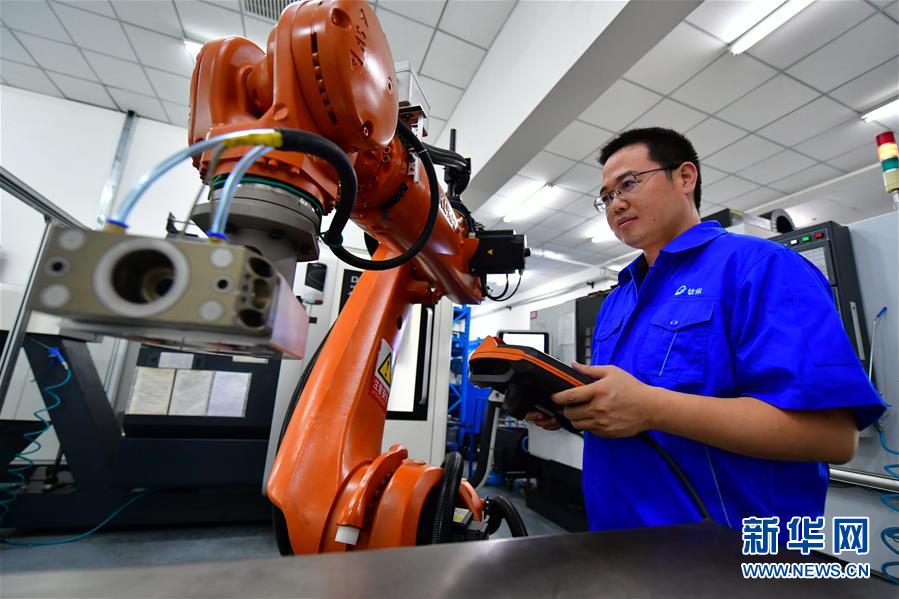(Peoples Daily Online)14:36, July 23, 2019

A customer scans QR code to complete payment at a snack shop in New Delhi, India, April 12, 2017. (Xinhua/Bi Xiaoyang)
China’s rising e-commerce and mobile payment systems are helping the expansion of the country’s internet technology in a global context.
Chinese enterprises are leading a new trend in the internet industry, and have established “super applications” such as mobile payments, providing modern systems for the world.
Those who have lived in India for over five years can feel that the lifestyle there is becoming more and more “Chinese”. Many places in India, inspired by the development models of the Chinese internet, are seeing more and more characteristics of China.
Because of smart phones and internet services, the life in New Delhi now has nothing different from that in Beijing where daily commodities can be shopped without stepping out of your own home, and one can even call for manicure and massage services from the internet.
Apart from online shopping platforms and car-hailing services, mobile payment and food delivery enjoying huge popularity in China, they are also seeing rapid development in India. In addition, although internet celebrity culture powered by short video and live streaming platforms has just started in India, it is rapidly becoming more and more popular.
Statistics indicate that India had over 500 million internet users and 30 smart phone users per 100 people by the end of the last year. The young generation (younger than the age of 35) accounts for over 60 percent of the total population, which is a powerful support for the internet economy.
A large number of Chinese internet enterprises have entered the Indian market the past few years, and media report that India is copying the first-half game of China’s internet development.
Apart from India, many supermarkets, restaurants and hotels in Cambodia’s Phnom Penh, Siem Reap and Sihanoukville now accept Alipay and WeChat Pay, the two largest mobile payment service providers of China.
China’s mobile payment technology is exerting a profound influence on relevant industries of Cambodia. Local service providers such as Pi Pay; Wing and True Money have actively sought for cooperation with Chinese partners to attract more Chinese users.
Tomas Pokorny, CEO of Pi Pay told People’s Daily that China’s rapid development of mobile payment is an important inspiration for Cambodia.
He said that financial technology companies need to establish a set of mobile payment infrastructure to provide high-quality, reliable and safe solutions for both urban and rural areas in Cambodia.
Pi Pay, which launched an e-wallet mobile application in Cambodia two years ago, offers cashless payment services. It now owns over 260,000 users and has dealt with 7.5 million individual transactions, with a total amount of over $170 million.
The company is now cooperating with Alipay and Chinese financial services corporation Union Pay, allowing the users of the latter to pay at its own service points across the country, Pokorny said.
According to him, the mobile payment market of Cambodia is seeing a continuous growth in new developers, as more and more users and merchants are realizing the convenience and potential of cashless payment – higher security and efficiency.
Pokorny predicted that cashless payment services will embrace further growth in Cambodia.
Vincent Yang, CEO of JD CENTRAL, an online shopping platform jointly launched by the Chinese online retailer giant JD.com and top Thai retailer Central Group, noted that JD.com has always been building a supply chain between China and Thailand, so that both people can enjoy quality products.
JD CENTRAL is also exploring the option to build retailing infrastructure in Thailand in order to integrate the e-commerce market of the country, Yang introduced.
“We hope that in Thailand, consumers can buy anything they want anywhere,” Yang said.
According to him, JD.com’s Thai branch is operating in the same business model with that of China, and its fast delivery has already become majorly competitor.
Moreover, the smart supply chain, as well as deeply customized push services of JD.com, has also been applied in Thailand.
![]()


